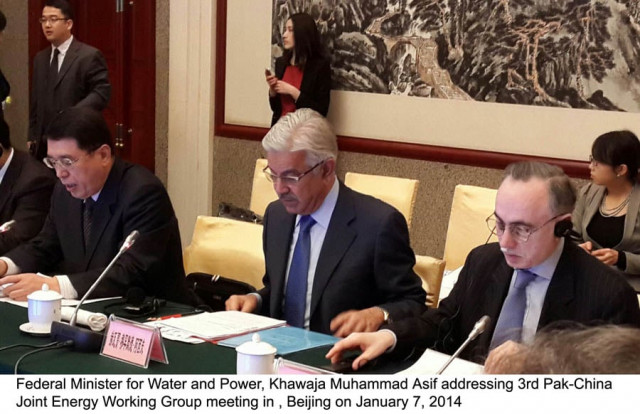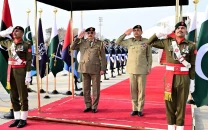US has failed in Afghanistan: FM Asif tells NA committee
Briefs NA committee on recent state of ties with US with particular focus on Tillerson’s visit

PHOTO: PID
Tillerson’s brief stay in Afghanistan on Monday triggered a controversy after he met President Ghani at the highly-fortified Bagram Airfield outside Kabul instead of his presidential palace. In a damage control exercise, the State Department issued a photo-shopped image, showing the meeting took place at the presidential palace, but the move backfired. Tillerson’s visit was kept secret until he left the country.
“The fact that the US secretary of state had to stay at Bagram Airfield speaks volumes of the US failure in bringing peace to Afghanistan,” Asif said on Thursday while briefing the National Assembly’s Standing Committee on Foreign Affairs.
Afghan strategy: Pakistan seeks recognition of ‘legitimate’ security concerns
The foreign minister gave a detailed briefing to the committee – which met at the Parliament House with Makhdoom Khusro Bakhtiar in the chair – about the current state of Pakistan-US relations, especially in the context of recent developments including the visit of Secretary Tillerson to Pakistan.
Asif made it clear that Pakistan would not compromise on its national interests and dismissed the perception that the government was taking any dictation from the US.
He said Pakistan had clearly told Tillerson that it would not become a US proxy but extend every possible help in its endeavour to bring some semblance of normalcy in Afghanistan.
Khawaja Asif had not just one but three Iqamas
Talking about the repeated demands seeking action against alleged sanctuaries, the foreign minister insisted that there were no terrorist hideouts in Pakistan.
He said one of the reasons that drone strikes had been far and few between in recent months was that there were neither sanctuaries nor actionable intelligence available in Pakistan.
Asif said the US was not ready to accept its failure in Afghanistan, and wanted to pass the buck on Pakistan. “We have clearly told them that Pakistan cannot be held responsible for [US] failures in Afghanistan. We cannot allow anyone to make us a scapegoat,” he maintained.
Earlier, in his opening remarks, the NA committee chairman said Pakistan’s response to President Trump’s South Asian policy had been collective, measured and based on realistic assessment of the situation.
Pakistan will not accept dictation from US, says Asif
“It is a moment of truth for the US in Afghanistan,” Bakhtiar said while underlining the importance of “not turning our differences into disputes”.
He appreciated the steps taken by the Pakistan government to improve border management along the border with Afghanistan as well as for repatriation of Afghan refugees and their resettlement in their country.
The chairman stressed the need for engaging with the US in promoting peace in Afghanistan. He expressed the hope that the US would not see Pakistan through the Afghan prism and work on a broad-based relationship to the benefit of both countries.
Members of the committee appreciated the briefing given by the foreign minister and asked questions on the situation in Afghanistan and Pakistan’s relations with the US and countries in the region.
The committee criticised the statement made by the Afghan president relating to CPEC. It expressed serious concern over the remarks made by the US Secretary of State in Kabul and New Delhi with regard to Pakistan.
Also on the agenda of the NA committee was Kulbhushan Jadhav’s case in the International Court of Justice. The additional attorney general briefed the committee on the current status of the case concerning the RAW agent, who had been sentenced to death by a military court for espionage and terrorism, and Pakistan’s legal options.



















COMMENTS
Comments are moderated and generally will be posted if they are on-topic and not abusive.
For more information, please see our Comments FAQ